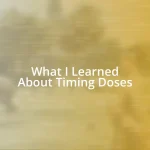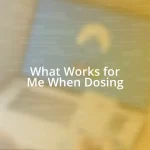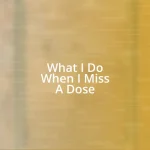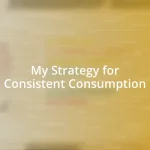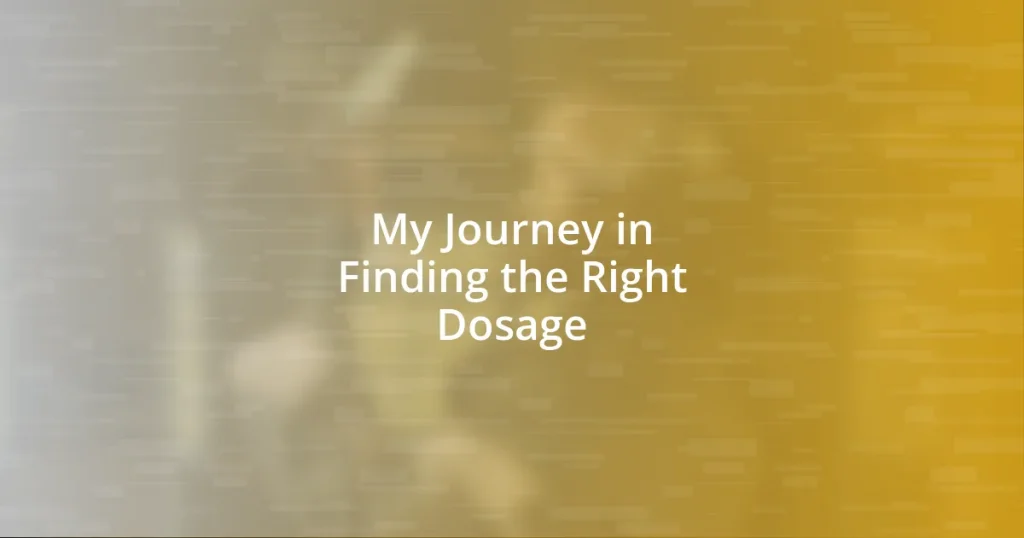Key takeaways:
- Understanding the right dosage is vital for effective treatment and requires personal assessment of health needs.
- Consulting with healthcare professionals fosters a collaborative approach that can lead to personalized treatment adjustments.
- Monitoring physical and emotional responses to medication helps in making informed decisions about dosage changes.
- Adjusting dosage is a dynamic process, requiring patience and responsiveness to one’s body signals for optimal health outcomes.
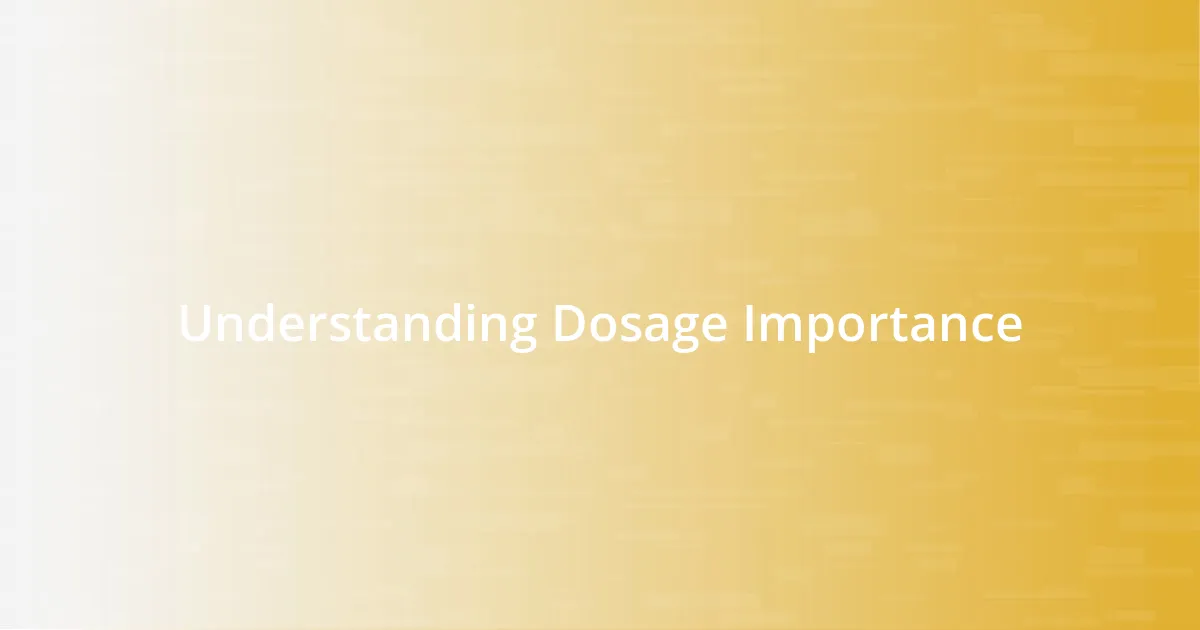
Understanding Dosage Importance
Understanding the right dosage is crucial because it directly influences treatment effectiveness and safety. I remember a time when I experienced a side effect from a medication simply because the dosage was slightly higher than what my body could handle. It made me wonder: how often do we overlook the impact of dosage on our health?
When you think about it, the difference between a therapeutic effect and adverse reaction can be just a few milligrams. I’ve seen friends struggle with finding their correct dosage for various medications, leading to months of trial and error. It can be frustrating and daunting, but understanding the importance of dosage helps demystify the process and empowers one to advocate for their health actively.
Moreover, everyone’s body reacts differently, which makes finding the right dosage akin to a personal journey. I’ve met individuals who felt hopeless after trying medication after medication, only to find relief when the dosage was adjusted. Reflecting on those experiences, it becomes clear that dosage isn’t just a number; it’s a key player in how well we heal and thrive.
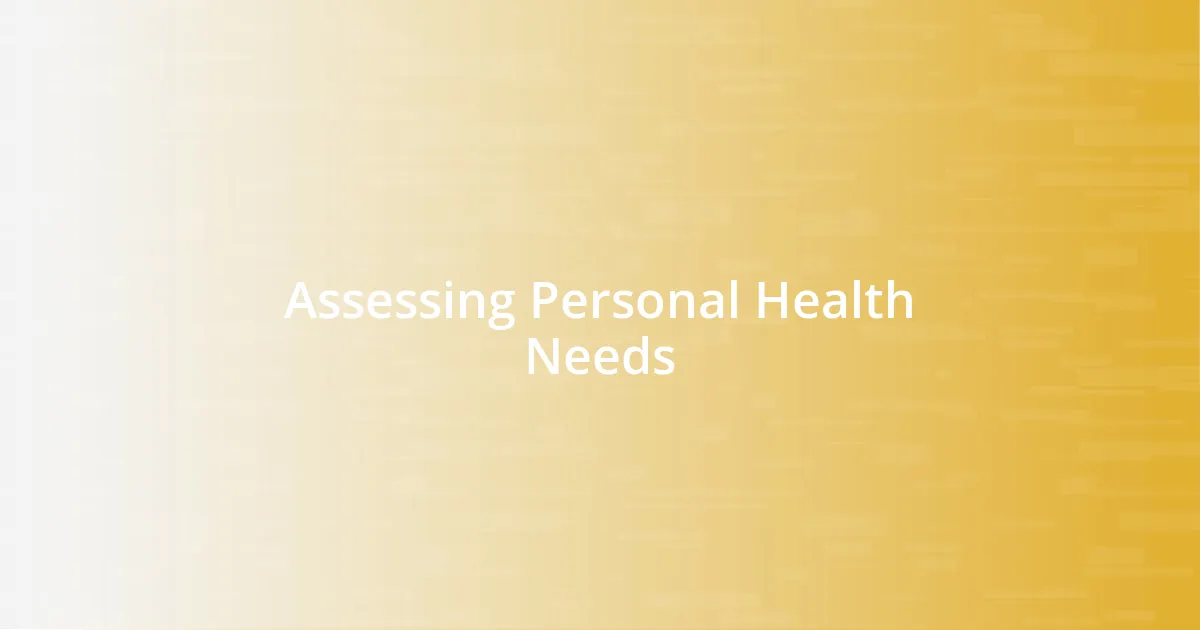
Assessing Personal Health Needs
Understanding my own health needs was a turning point in my journey. I used to think that once a doctor prescribed a medication, the dosage would automatically be right for me. However, I learned through experience that it’s essential to listen to my body. Each time I adjusted my dosage, I noticed not just the biological changes but also the emotional shifts that came with them.
When assessing personal health needs, consider the following factors:
- Previous Reactions: Take note of any past medications or dosages that didn’t sit well with you. Reflecting on these experiences can serve as a guide.
- Lifestyle Factors: Recognize that your daily activities, stress levels, and diet play crucial roles in how your body metabolizes medication.
- Mental and Emotional State: Acknowledge how your mood and mental health can affect your response to treatment. I once realized that my anxiety heightened when my dosage felt off, impacting my overall well-being.
- Consultation with Healthcare Professionals: Engaging in open conversations with your doctor about any side effects or concerns fosters a collaborative approach to your health.
- Self-Monitoring: Keeping a journal of how you feel during different dosages can reveal patterns that you might not notice otherwise.
In my experience, taking the time to truly assess my health needs has been invaluable. It’s about more than just numbers on a prescription; it’s about connecting with my own body’s wisdom.

Consulting Healthcare Professionals
When it comes to consulting healthcare professionals, I’ve found open dialogue to be incredibly important. I remember discussing my medication side effects with my doctor, who listened patiently and helped me feel supported. It was refreshing to have someone guide me through the maze of options and adjustments. I realized that this partnership is crucial for finding the most effective dosage.
Additionally, it’s essential to trust and communicate honestly with your healthcare team. I once hesitated to voice my concerns, worrying I might sound overly critical or demanding. However, when I finally did speak up, my doctor appreciated my honesty. It led to a dosage adjustment that improved my symptoms drastically. This experience taught me that effective communication is key—it transforms a prescription into a personalized treatment.
In my journey, I discovered that healthcare professionals can provide insight that goes beyond just medication. For instance, my pharmacist suggested lifestyle changes that complemented my treatment, which I hadn’t considered. Their expertise and perspective made me realize that dosage isn’t solely about the numbers but also about how individualized care can lead to better health outcomes.
| Aspect | Consulting Healthcare Professionals |
|---|---|
| Key Benefit | Personalized Guidance & Support |
| Importance of Communication | Addresses Concerns for Appropriate Adjustments |
| Collaboration | Engages Patients in Their Health Journey |
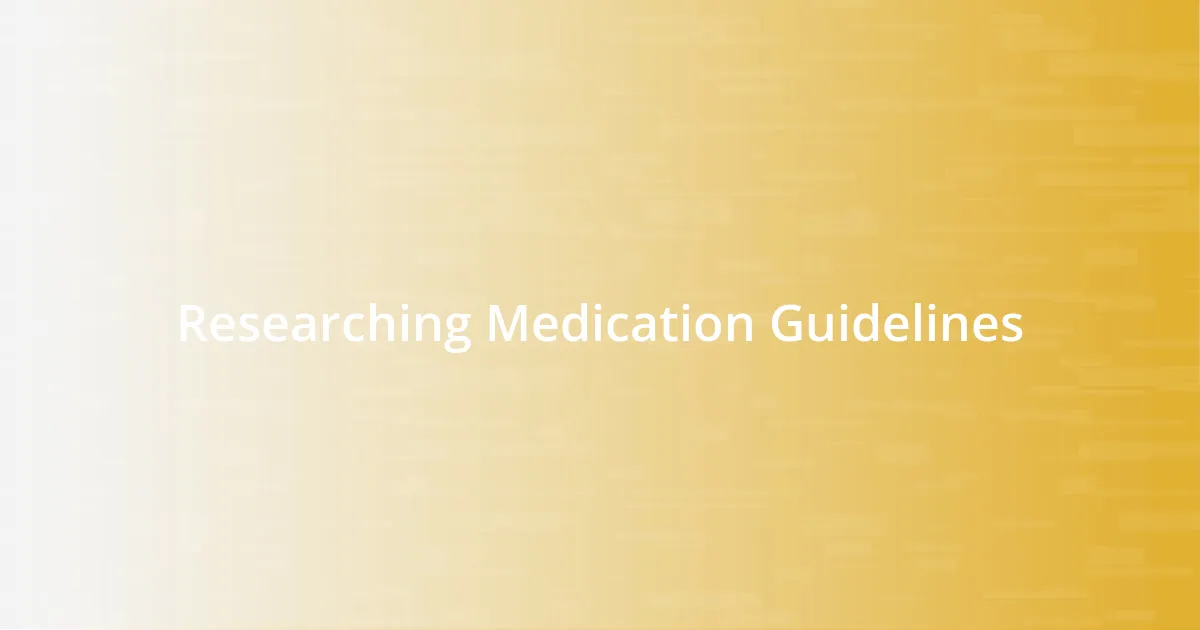
Researching Medication Guidelines
Researching medication guidelines was a journey that widened my understanding of treatment options. I recall scrolling through various reputable websites, analyzing everything from clinical studies to patient forums. It struck me: how could I rely solely on my doctor’s advice without equipping myself with knowledge?
During this research process, I discovered the importance of reputable sources. I found that guidelines often varied between different health organizations. For instance, while one source emphasized a conservative approach to dosage increases, another suggested more aggressive adjustments. It made me wonder: which path was most suitable for my unique situation? This realization pushed me to question everything and seek a comprehensive view rather than relying on a single narrative.
Each piece of information I gathered contributed to my growing understanding of how medications work in the body. I vividly remember one article that explained how certain dosages might influence not only physical outcomes but also emotional well-being. As I read through personal stories aligned with those insights, I felt a sense of camaraderie with others who were navigating similar challenges. It reminded me that I wasn’t alone in this complex journey of finding the right dosage.
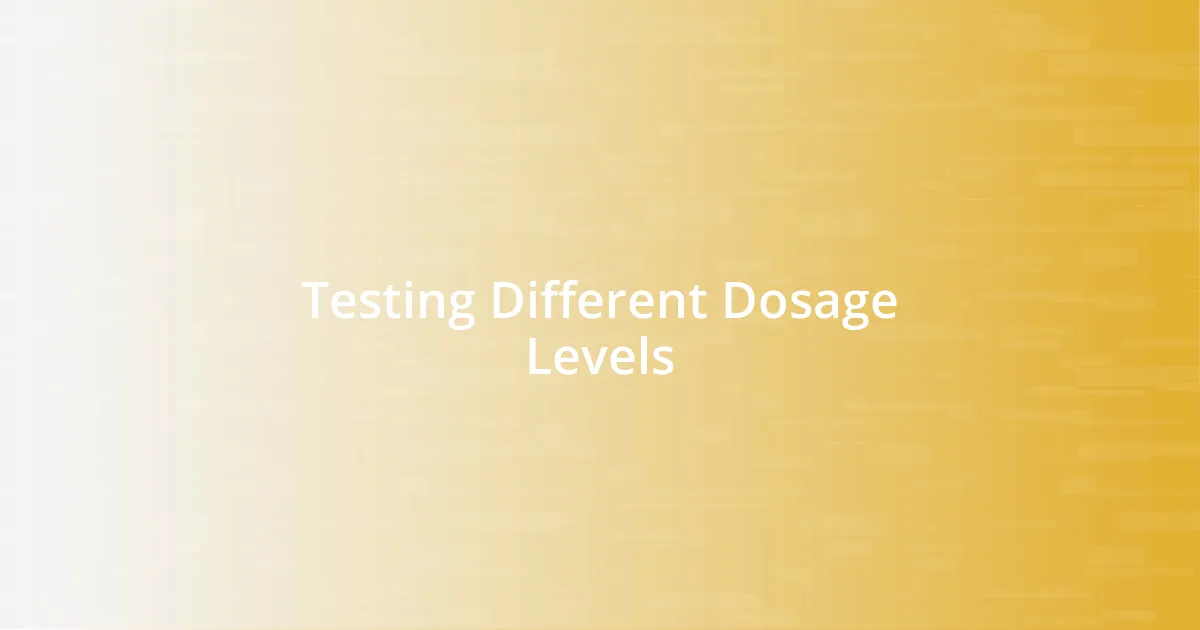
Testing Different Dosage Levels
Testing different dosage levels was a pivotal part of my journey. One time, I kept a journal to track my reactions, which was incredibly enlightening. I noted everything—my mood, energy levels, and any side effects—after each dosage change. Looking back, I realize that documenting my experiences was like mapping the terrain of my health; I could see how minor adjustments led to significant shifts in how I felt.
Experimentation wasn’t always smooth sailing. I remember a particular dosage that left me feeling unusually anxious. It was like trying on a pair of shoes that looked great but pinched uncomfortably when I walked. At that moment, I had to ask myself: Was I willing to compromise my comfort for the sake of a number on a prescription? Ultimately, this question drove me to advocate for myself, leading to a dosage that balanced efficacy and well-being.
Through this testing phase, I discovered that finding the right dosage is very much about intuition. There were days when I felt the urge to push through discomfort, thinking it would benefit me in the long run. I had to learn that listening to my body was just as vital as adhering to any medical advice. In this process, I not only found a dosage that worked but also uncovered a deeper understanding of my health needs. What a revelation it was to realize that this journey was not just about medication, but about me reclaiming my agency!
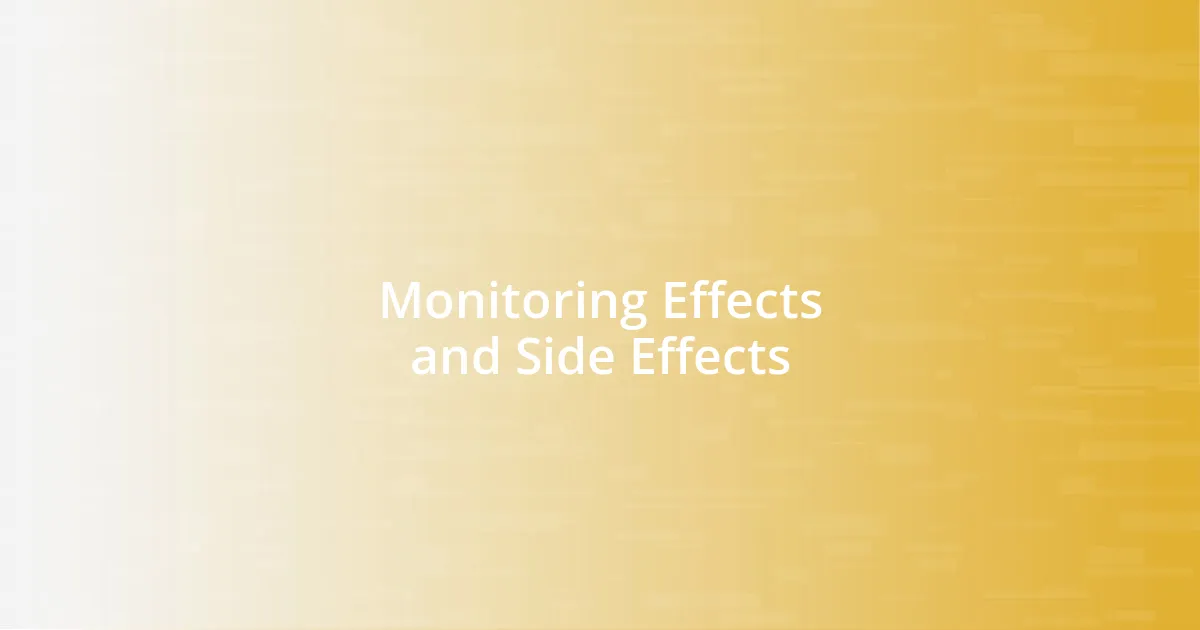
Monitoring Effects and Side Effects
Monitoring the effects and side effects of my medication became a critical part of my journey. I vividly remember sitting at my kitchen table with a cup of tea, reflecting on how each adjustment affected me. I found it fascinating how some side effects, like slight drowsiness, emerged rather than expected euphoric feelings. It made me wonder, were those sensations merely a natural adjustment, or did they signal a need for change?
Keeping track of my physical and emotional state was essential. I would often ask myself: how often should I be feeling better versus just tolerating discomfort? Recognizing patterns took time, but the more I paid attention, the clearer my body’s responses became. There were days when side effects felt overwhelming—like a weight tugging at my spirit. It was during those moments that I realized the necessity of my doctor’s feedback, which helped balance my subjective experiences with professional insights.
What truly struck me was the sense of empowerment I gained from this monitoring process. I started to appreciate that each dosage I experimented with was a step toward understanding my health. It’s like tuning a musical instrument; sometimes I needed to tighten or loosen a string to achieve harmony. When I could clearly articulate my observations—both positive and negative—it not only improved my treatment but also fostered a deeper connection with my own healing journey. Did I mention how rewarding it felt to share those insights with my doctor and see our discussion evolve?
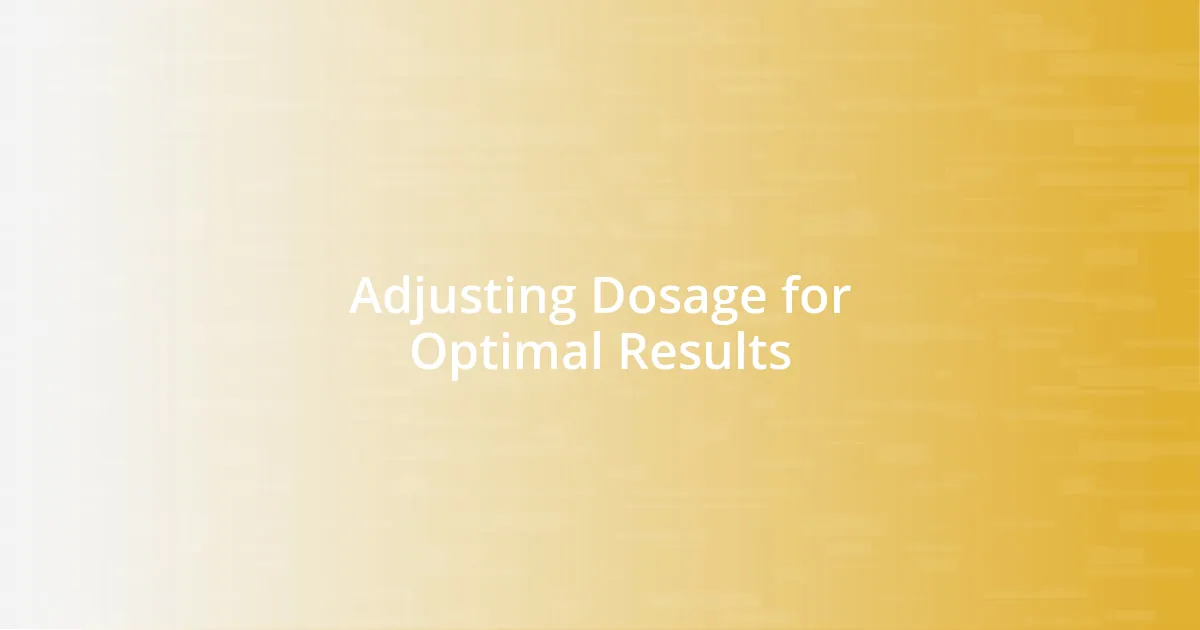
Adjusting Dosage for Optimal Results
Adjusting the dosage for optimal results is like finding the sweet spot in a recipe. I vividly recall a moment when I reduced my dosage slightly after noticing some fatigue creeping in. Almost immediately, I felt a shift—my energy returned, and my mind felt clearer. It was a real eye-opener to see how even small changes could yield profound differences in my day-to-day life.
I often questioned—how do we know when it’s time to make a change? There were instances when I hesitated, thinking that maybe I just needed to adjust my mindset rather than my dosage. However, experience taught me that my body was an excellent communicator. When I started to notice my sleep disturbances increasing, it was the indicator I couldn’t ignore. Trusting my instincts, I approached my doctor, and together we reassessed my dosage.
What I found compelling during this journey was the interplay between patience and responsiveness. Adjustments required time to reflect and gauge their impact. I remember feeling a sense of anticipation each time I made a change—would this be the one? Learning to be patient allowed me to appreciate the process, turning it into a duo dance of sorts, where I listened and responded to my body’s needs with care. Isn’t it fascinating how every tweak opens a new chapter in our understanding of ourselves?





